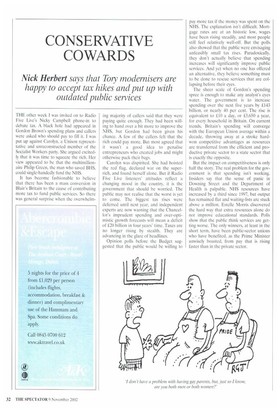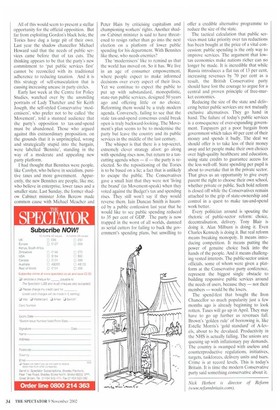CONSERVATIVE COWARDS
Nick Herbert says that Tog modernisers are
happy to accept tax hikes and put up with outdated public services
THE other week I was invited on to Radio Five Live's Nicky Campbell phone-in to debate tax. A black hole had appeared in Gordon Brown's spending plans and callers were asked who should pay to fill it. I was put up against Carolyn, a Unison representative and unreconstructed member of the Socialist Workers party. She argued excitedly that it was time to squeeze the rich. Her view appeared to be that the multimillionaire Philip Green, the man who saved BHS, could single-handedly fund the NHS.
It has become fashionable to believe that there has been a mass conversion in Blair's Britain to the cause of contributing more tax to fund public services. So there was general surprise when the overwhelm
ing majority of callers said that they were paying quite enough. They had been willing to hand over a bit more to improve the NHS, but Gordon had been given his chance. A few of the callers felt that the rich could pay more. But most agreed that it wasn't a good idea to penalise entrepreneurs who created jobs and might otherwise pack their bags.
Carolyn was dispirited. She had hoisted the red flag, declared war on the superrich, and found herself alone. But if Radio Five Live listeners' attitudes reflect a changing mood in the country, it is the government that should be worried. The public may not realise that the worst is yet to come. The biggest tax rises were deferred until next year, and independent experts are now warning that the Chancellor's imprudent spending and over-optimistic growth forecasts will mean a deficit of £20 billion in four years' time. Taxes are no longer rising by stealth. They are advancing in the glare of headlines.
Opinion polls before the Budget suggested that the public would be willing to pay more tax if the money was spent on the NHS. The explanation isn't difficult. Mortgage rates are at an historic low, wages have been rising steadily, and most people still feel relatively well-off. But the polls also showed that the public were envisaging unfeasibly small tax rises. Paradoxically, they don't actually believe that spending increases will significantly improve public services. And yet when no one has offered an alternative, they believe something must to be done to rescue services that are collapsing before their eyes.
The sheer scale of Gordon's spending spree is enough to make any analyst's eyes water. The government is to increase spending over the next five years by £143 billion, or nearly 40 per cent. The rise is equivalent to £10 a day, or £3,650 a year, for every household in Britain. On current trends, Britain's spending will converge with the European Union average within a decade, throwing away at a stroke hardwon competitive advantages as resources are transferred from the efficient and productive private sector to a state sector that is exactly the opposite.
But the impact on competitiveness is only half the story. The real problem for the government is that spending isn't working. Insiders say that the sense of panic in Downing Street and the Department of Health is palpable. NHS resources have increased by a third since 1997, but output has remained flat and waiting-lists are stuck above a million. Estelle Morris discovered the hard way that extra resources alone do not improve educational standards. Polls show that the public think services are getting worse. The only winners, at least in the short term, have been public-sector unions who have benefited, as the Prime Minister unwisely boasted, from pay that is rising faster than in the private sector.
All of this would seem to present a stellar opportunity for the official opposition. But far from exploiting Gordon's black hole, the Tories have dug a large pit of their own. Last year the shadow chancellor Michael Howard said that the needs of public services came before that of tax cuts. The thinking appears to be that the party's new commitment to 'put public services first' cannot be reconciled with its traditional adherence to reducing taxation. And it is this strategy of self-emasculation that is causing increasing unease in party circles.
Early last week at the Centre for Policy Studies, watched over by the unsmiling portraits of Lady Thatcher and Sir Keith Joseph, the self-styled Conservative 'modernisers', who prefer not to be called 'the Movement', told a stunned audience that the party's opposition to tax-and-spend must be abandoned. Those who argued against this extraordinary proposition, on the grounds that it is unprincipled, wrong and strategically stupid into the bargain, were labelled Termite', standing in the way of a moderate and appealing new party platform.
I had thought that Bennites were people, like Carolyn, who believe in socialism, punitive taxes and more government. Apparently, the new Bennites are people, like me, who believe in enterprise, lower taxes and a smaller state. Last Sunday, the former shadow Cabinet minister John Bercow made common cause with Michael Meacher and Peter Hain by criticising capitalism and championing workers' rights. Another shadow Cabinet minister is said to have threatened to resign rather than go into the next election on a platform of lower public spending for his department. With Bennites like these, who needs enemies?
The 'modernisers' like to remind us that the world has moved on. So it has. We live in an age of consumer empowerment, where people expect to make informed decisions over every aspect of their lives. Yet we continue to expect the public to put up with substandard, monopolistic, state-run public services, designed 50 years ago and offering little or no choice. Reforming them would be a truly modern agenda. Conversely, failing to see that the stale tax-and-spend consensus could break open is truly backward-looking. The Movement's plan seems to be to modernise the party but leave the country and its public services in the middle of the last century.
The whisper is that there is a top-secret, extremely clever strategy afoot: go along with spending rises now, but return to a taxcutting agenda when — if — the party is reelected. So the repositioning of the Tories is to be based on a lie; a fact that is unlikely to escape the public. The Conservatives gave a small hint that they were not 'living the brand' (in Movement-speak) when they voted against the Budget's tax and spending rises. They still won't say if they would reverse them. lain Duncan Smith is haunted by a public confession last year that he would like to see public spending reduced to 35 per cent of GDP. The party is now trapped in the worst of all worlds, damned as serial cutters for failing to back the government's spending plans, but unwilling to offer a credible alternative programme to reduce the size of the state.
The tactical calculation that public services must take priority over tax reductions has been bought at the price of a vital concession: public spending is the only way to improve services. The argument that lowtax economies make nations richer can no longer be made. It is incredible that while Russia introduces a flat tax of 13 per cent, increasing revenues by 70 per cent as a result, the British Conservative party should have lost the courage to argue for a central and proven principle of free-market economics.
Reducing the size of the state and delivering better public services are not mutually exclusive alternatives. They go hand in hand. The failure of today's public services is a consequence of ever-expanding government. Taxpayers get a poor bargain from government which takes 40 per cent of their money and spends it badly. The deal we should offer is to take less of their money away and let people make their own choices over high-quality healthcare and education, using state credits to guarantee access for the less well-off. State spending per pupil is about to overtake that in the private sector. That gives us an opportunity to give every parent the right to choose their own school, whether private or public. Such bold reform is closed off while the Conservatives remain attached to the grip of state-ownership and control in a quest to make tax-and-spend work better.
Every politician around is spouting the rhetoric of public-sector reform: choice, decentralisation, delivery. Tony Blair is doing it. Alan Milburn is doing it. Even Charles Kennedy is doing it. But real reform means breaking monopoly. It means introducing competition. It means putting the power of genuine choice back into the hands of the people. And it means challenging vested interests. The public-sector union officials, some of whom were given a platform at the Conservative party conference, represent the biggest single obstacle to building responsive public services around the needs of users, because they — not their members — would be the losers.
The spend-fest that bought the Iron Chancellor so much popularity just a few months ago is already beginning to look rotten. Taxes will go up in April. They may have to go up further as revenues fall. Brown's 'golden rule' of borrowing is, like Estelle Morris's 'gold standard' of A-levels, about to be devalued. Productivity in the NHS is actually falling. The unions are queuing up with inflationary pay demands. The country is swamped with useless and counterproductive regulations, initiatives, targets, taskforces, delivery units and tsars. Crime is at record levels. This is today's Britain. It is time the modern Conservative party said something conservative about it.
Nick Herbert is director of Reform (www.reformbritain.com).



















































































































 Previous page
Previous page